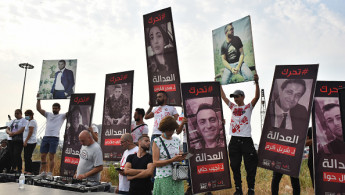'Remember their faces': Anger as pictures of Beirut blast victims removed from wall
Social media users in Lebanon and beyond expressed anger after pictures of the victims who died in the Beirut Port explosion in 2020 were erased from a wall in central Beirut.
Videos surfaced online showed men pressure washing a wall around a construction site in downtown Beirut that had drawings of some of more than the 220 victims plastered on.
An iconic memorial, murals by @1bradyblack commemorating the victims of the #BeirutBlast is removed in central Beirut. pic.twitter.com/XS5hqODdcU
— Matt Kynaston (@MattKynaston) January 19, 2023
It is not clear who gave the instructions - the Beirut municipality, the owners of the property, or Solidere - the company in charge of rebuilding and renovating downtown Beirut since 1994.
The removal drew fierce criticism online, with social media users saying that the Lebanese ruling elite wanted people to forget about the 2020 tragedy.
Drawings of murdered victims of the Beirut port explosion being deliberately erased from our public spaces, now.
— Karim Safieddine - كريم صفي الدين (@safieddine00) January 19, 2023
This is exactly what the regime wants: Erasing our public memory of its crimes and victims. pic.twitter.com/F5otqoMUBC
For 2 years, faces of the victims of the Beirut Blast stood there..every time i passed by, i looked into their eyes, and felt the rage inside...Today, terrorists in the government choose to burry these faces again...Never forget, Never forgive, Let their memory fill the streets❤️ pic.twitter.com/jMqLpgLThB
— Rawan Batlouni (@batlouni_rawan) January 19, 2023
It came in light of recent developments related to the port explosion.
William Noun, the brother of a firefighter who died in the massive 4 August 2020 blast, was detained and remained in custody for a night last week.
He was called in for interrogation and arrested after making remarks on a television show where he threatened, in a moment of rage, to "blow up the Palace of Justice" if it continued to stall the probe and prevent Investigating Judge Tarek Bitar from completing his work.
Embattled Judge Bitar has faced an endless series of complaints against him, part of a campaign led by the Shia groups Hezbollah and the Amal to remove him.
Noun's arrest sparked protests. His relatives and relatives of other victims, joined by activists and lawmakers, cut off roads in the capital and other parts of the country.
The families of the victims have upped pressure and are calling for an international investigation which Hezbollah opposes, saying the case will be politicised against the Iran-backed militant movement.
The 2020 disaster, one of history's biggest non-nuclear explosions, severely damaged vast areas of Beirut after a stockpile of ammonium nitrate haphazardly stored in a warehouse for years caught fire.




 Follow the Middle East's top stories in English at The New Arab on Google News
Follow the Middle East's top stories in English at The New Arab on Google News


